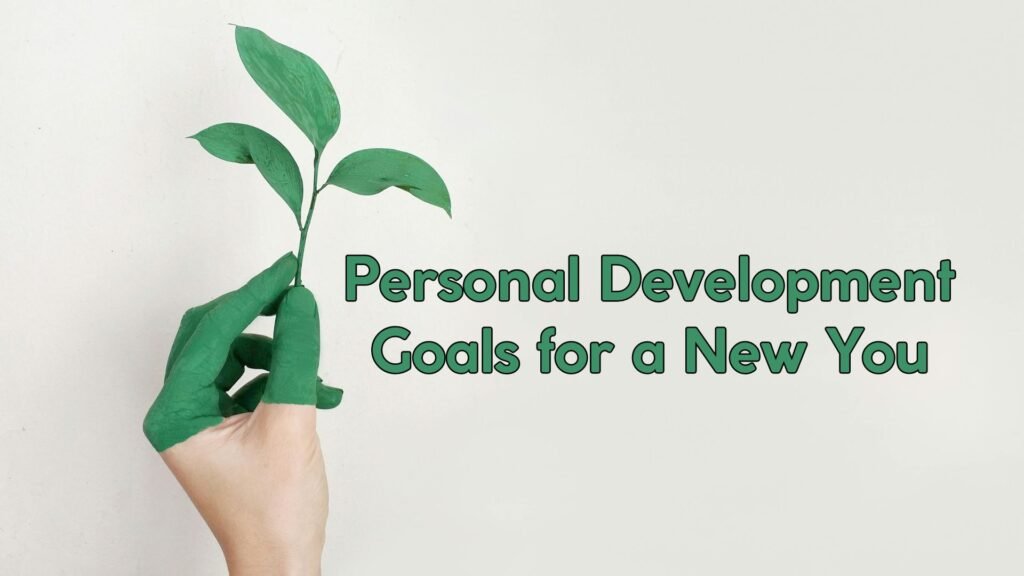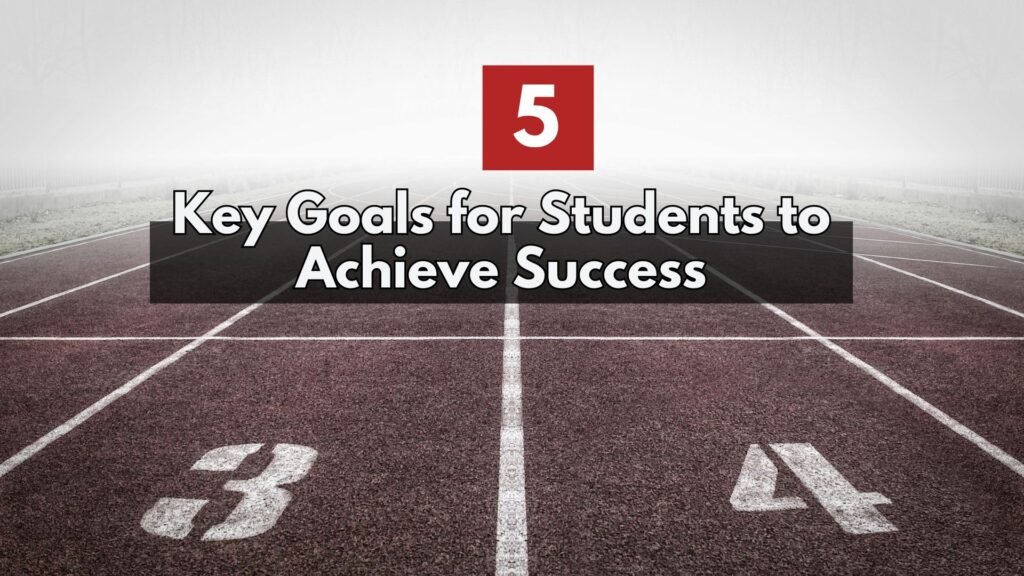Hey Beautiful,
You need personal development goals to take control of your life. So you can become aware of your strengths and areas where you can grow.
These goals develop great qualities like resilience, patience, and discipline in you. With time these qualities become your lifestyle.
The beauty of personal development goals is that they make you think beyond material success. They make you ask important questions, like:
- Who do I want to become?
- What kind of skills, habits, or qualities I want to build over time?
- How can I make my life more meaningful?
In this article, I’ll tell you about some best personal development goals you must set for yourself. These goals will not only improve your personal life but also help you grow professionally.
Personal Development Goals for a New You
Goal 1: Enhance Your Learning

The world is changing really fast. New technologies and ideas pop up all the time. If you don’t keep learning, you risk falling behind.
Why It Matters
You Stay Up-to-Date:
Every industry is evolving. What was cutting-edge a few years ago is not relevant now. By committing to lifelong learning, you stay relevant. You know what’s happening in your field, and you’re ready to adapt.
Plus, continuous learning opens doors for your career. Employers love to see people who invest in themselves. It shows you’re proactive and willing to grow.
Enhancing Problem-Solving Skills
Learning improves your problem-solving skills. The more you know, the better you’re equipped to tackle challenges. New information gives you fresh ideas. You think outside the box and come up with creative solutions.
Mental Health Benefits
Learning also has mental health benefits. It keeps your mind sharp. When you achieve learning goals, a sense of accomplishment boosts your happiness and overall well-being.
Value in a Knowledge-Based Economy
We’re in a knowledge-based economy. What you know is what sets you apart. Continuous learning increases your value. It makes you more attractive to employers and collaborators.
Strategies to Enhance Your Learning
- Mix It Up: Don’t just stick to one way of learning. Read books, watch documentaries, listen to podcasts, and take online courses.
- Set Learning Goals: What do you want to know more about? It could be climate change, a new skill, or a new hobby. Write it all down and make a plan.
- Join a Learning Community: Join with other learners who share the same interests as yours. This could be an online forum, a local book club, or a study group. Share ideas and discuss what you’ve learned.
Tools to Expand Your Knowledge
- Online Platforms: Check out websites like Coursera, edX, and Khan Academy. They offer courses on all sorts of topics from universities around the world.
- Books and Audiobooks: Always incorporate some good books to read in your schedule. And if you’re always on the go, listen to the audiobooks.
- Podcasts and Documentaries: These are great for learning about specific topics. they also present information in a more engaging, storytelling format, which is easy to remember.
Make Learning a Part of Your Daily Life
- Pick a New Interest: Choose something you’re curious about but never had the time to explore.
- Schedule Weekly Learning Time: Set aside a specific time each week dedicated to learning. E.g. an hour every Sunday morning or 20 minutes each day during lunch.
- Make it a Priority: Treat your learning time as important as any other commitment. It’s an investment in yourself, after all.
Fast Fact
Setting aside dedicated time each week for learning improves your success rate by 70% and increases your knowledge retention by 30%!
Goal 2: Get Healthier
Your health impacts every aspect of your life. When you feel good physically, you also feel better mentally and emotionally. It sets the foundation for success in all your other goals.
What is Being Healthy Means?
Everyone’s definition of health is different, it doesn’t mean you have to follow a strict diet or spend hours in the gym. This includes eating nutritious foods, staying active, and managing stress.
Practical Ways to Get Healthier
- Get Moving: Find activities you enjoy and do them regularly. For example walking, biking, swimming, or dancing – whatever gets you excited to move!
- Eat Well: Eat whole foods like fruits, veggies, lean meats, and whole grains. Gradually cut back on processed foods, sugars, and unhealthy fats.
- Sleep Better: Set a regular bedtime and create a calming routine to help you unwind. Avoid screens and caffeine before bed to improve the quality of your sleep.
- Drink Up: Stay hydrated by drinking plenty of water throughout the day. Drink at least 8 glasses, or more if you’re active or it’s hot outside.
Resources to Improve Physical Health
- Fitness Apps: Use apps like MyFitnessPal to track your nutrition and Strava to monitor your exercise.
- Healthy Eating Blogs and Websites: Explore sites like EatingWell and Minimalist Baker for lots of nutritious recipes. These resources cater to various dietary needs, and give you healthy meal options that fit your lifestyle.
- Sleep Tracking Devices: Gadgets like Fitbit or apps like Sleep Cycle are best to monitor your sleep patterns. They provide valuable data to help you understand and enhance the quality of your sleep.
Incorporate Healthy Habits into Your Life
Start small. Choose one aspect of your health to focus on this week. Then, come up with a simple plan for the next week that you know you can stick to.
For example: Take a 15-minute walk each day or add a serving of vegetables to each meal.
Overcoming Obstacles to Physical Health
Improving your physical health takes:
- Patience
- Commitment
- Self-compassion
One common challenge is to find time for exercise and meal preparations. You can overcome this by fitting healthy habits into your daily routine.
For example, prepare your meals ahead of time to save time during the week. Turn social outings into active ones by going for walks with friends.
Goal 3: Wake Up Earlier in the Morning

Make a goal to wake up earlier in the morning. It has a profound impact on your life. Waking up earlier gives you precious extra time to start your day off right.
Use this time for activities that nourish you and set a positive tone for the day ahead. It’s a chance to invest in yourself before the day’s responsibilities kick in.
Let’s explore how you can make this happen, step by step.
Easy Ways to Rise and Shine
- Set a Goal Time: Be realistic. If you currently wake up at 8 AM, don’t suddenly try to become a 5 AM person. Start with 7:45 AM and gradually work your way earlier.
- Create a Morning Routine You Love: Give yourself something to look forward to in the morning. For me, it was a quiet cup of coffee and 15 minutes of reading before the day began. Find what brings you joy and make it part of your morning.
- Prep the Night Before: Make your mornings easier by doing some prep the night before. Lay out your clothes, prep your breakfast, and know what you need to do first thing in the morning.
Helpful Tools for Early Risers
- Alarm Clock Apps: Try apps that wake you gently, like Sleep Cycle. They monitor your sleep patterns and wake you during your lightest sleep phase.
- Light Therapy Lamps: These mimic natural sunlight, and regulate your body’s sleep-wake cycle. They are especially helpful when you’re waking up before the sun.
Make It a Part of Your Everyday
Start Tonight: Take small steps toward your goal. Set your alarm just 15 minutes earlier for tomorrow. And before you go to bed, think about something exciting you can do with your extra time in the morning.
If It’s Hard to Get Up?
It’s Normal: Don’t worry if it’s tough at first. If you keep hitting snooze, try putting your alarm across the room. This way, you have to get out of bed to turn it off. And once you’re up, stay up—no crawling back into bed!
Embrace the Early Hours:
Waking up earlier gives you a whole new part of the day to enjoy. You can most of your mornings and, in turn, make the most of your life. Embrace those early hours and see how they transform your days.
Goal 4: Mindfulness and Stress Management
In today’s busy world, it’s easy to get overwhelmed by stress. That’s why setting a goal for mindfulness and stress management is important.
When you manage stress well, you improve your mental health, physical well-being, and overall quality of life. Mindfulness, in particular, helps you stay calm and centered.
Deepening Your Mindfulness Practice
- Mindful Moments: Start small. Set aside just a few minutes each day to focus on your breath. This simple exercise is best for practicing mindfulness.
- Daily Mindfulness Practice: Add mindfulness activities to your routines. For example, The Center for Mindful Eating has resources to make meal times more mindful. Use their techniques in your daily life.
- Breathing Exercises: The 4-7-8 breathing technique is a quick way to manage stress. Dr. Andrew Weil’s videos will guide you through this practice effectively.
Mindfulness and Stress Management Resources:
- Mobile Apps: Use apps like Headspace and Calm. They offer guided meditations for everything from stress relief to better sleep.
- Online Platforms: Websites like Mindful.org are packed with articles, practices, and recommendations for mindfulness meditation. It’s a great starting point for newcomers to mindfulness. It offers insights into how to bring mindfulness into your daily life.
- Mindfulness Books: “Wherever You Go, There You Are” by Jon Kabat-Zinn and “The Miracle of Mindfulness” by Thich Nhat Hanh are fantastic reads that introduce mindfulness principles and how to apply them in everyday life. These books break down mindfulness in a way that’s easy to understand and apply to your life.
Incorporate Mindfulness into Your Day
Choose one method to try this week. Start with a guided meditation using an app every morning or turn one daily activity (e.g. eating or brushing) into a mindfulness practice.
Fully focus on the activity. And notice your thoughts and feelings without judging them.
Goal 5: Learn Time Management
Time is valuable, and how you use it matters. When you manage your time well, you increase your chances of success.
Good time management lets you take charge of your schedule and make the most of each day. Instead of feeling stressed by a long list of things to do, you approach your tasks with a clear plan.
Strategies for Mastering Time Management
- Prioritize tasks based on importance.
- Set boundaries to protect your time.
- Use tools like digital calendars and task managers.
Time Management Resources
Apps and Software: Trello is great for visual task management. It’s a digital whiteboard where you can organize all your projects and tasks. Plus, Google Calendar is great for planning your week and seeing where your time goes.
Books: “Deep Work” by Cal Newport is a must-read. It will teach you the value of focused, distraction-free work time.
Online Courses: Platforms like Coursera offer courses on time management and productivity. They’re a great way to learn new techniques and strategies.
Implement Time Management Techniques
Choose one technique to try this week. If you’re not sure where to start, try the Eisenhower Matrix.
Here’s how it works:
- List all your tasks.
- For each task, ask yourself two questions: Is it urgent? Is it important?
- Based on your answers, sort your tasks into four categories:
- Urgent and important: Do these tasks right away.
- Important but not urgent: Schedule these for later.
- Urgent but not important: Try to delegate these if possible.
- Neither urgent nor important: Consider eliminating these tasks.
This method makes it clear what truly needs your attention and what you should let go.
Time Management Challenges
If you’re struggling with time management, Do a time audit:
- Track everything you do for a week.
- Write down each activity and how long it takes.
- At the end of the week, review your notes.
- Look for activities that don’t add value to your goals or productivity.
- Make adjustments to reduce or eliminate time-wasting habits.
- Use the insights to create a more intentional and focused schedule.
Goal 6: Hobbies and Leisure Goals
It’s easy to get caught up in work, responsibilities, and personal goals. But having hobbies and leisure activities gives your mind a much-needed break.
Hobbies give you a break from the hustle of daily life. It recharges you mentally and physically. Leisure activities help you relax, reduce stress, and boost creativity. They also bring more joy and fulfillment into your life.
Strategies for Enjoying Hobbies and Leisure
Let’s talk about adding some fun to your life!
- Try Something New: Step out of your comfort zone. Try something new! It could be painting, hiking, coding, or cooking. Exploring different activities helps you discover what truly excites you.
- Plan Some Chill Time: Just like you plan your important stuff, make sure to schedule time for hobbies and fun activities. It’s important to relax and have a good time amidst all your responsibilities.
- Meet Some New Friends: Sharing your hobbies with others makes them even more enjoyable. Join clubs or groups related to your hobbies and meet with people who share your interests.
Resources for Exploring Hobbies and Leisure
Hey, let’s find some cool stuff to do!
- Meetup: Check out Meetup! It’s a place where you can find groups with similar interests near you. Whether you’re into outdoor adventures, writing, or tech stuff, Meetup finds you people to hang out with.
- Skillshare: It’s an awesome online community where you can learn all kinds of cool stuff like design, photography, and cooking. It’s perfect for picking up a new hobby or getting better at something you already love.
- Local Community Centers: Don’t forget about your local community center! They have tons of fun activities like art classes and sports leagues. It’s a great way to try out new hobbies and meet people in your neighborhood.
Incorporate Hobbies In Your Life
Choose a New Activity: Pick something you’ve always wanted to try but never did. Schedule time this week to start, whether it’s researching, signing up for a class, or just setting aside time to give it a go.
Overcome Common Barriers
- Make Time: It’s common to feel like you don’t have time for hobbies. Leisure time isn’t a luxury—it’s essential for your well-being. Start small, with just 30 minutes a week, and build from there.
- Benefits of Hobbies: Hobbies and leisure are very important for a happy life. They make you relax, learn new things, and meet new people. By adding them to your life, you’ll find more joy and excitement in your life journey.
Goal 7: Develop Financial Acumen
Setting a goal to develop financial acumen is one of the smartest moves you can make for your long-term success.
Understanding how money works, how to manage it, and how to make it grow is key to building a stable and secure future.
Whether it’s budgeting, saving, or investing, financial literacy puts you in control of your finances rather than feeling controlled by them.
Strategies for Enhancing Financial Acumen
Let’s talk about ways to get better at managing money:
- Learn the Basics: Understand concepts like budgeting, saving, investing, and managing debt. With this basic knowledge, you can make smarter choices with your money and feel more in control of your financial situation.
- Set Goals: What do you want to achieve financially? Do you want to save up for something special, like a vacation or a new car? Or maybe you want to pay off your student loans? Setting clear goals gives you something to work towards.
- Keep Track of Your Money: It’s important to know where your money is going. Keep track of your spending. Write down what you spend each day or use a budgeting app.
- Make Saving Easy: Set up automatic transfers from your checking account to your savings account. This way, you’re saving money without even thinking about it. It’s a great way to build up your savings over time.
Resources for Building Financial Acumen
Here are some helpful resources to boost your financial knowledge
- Personal Finance Books: “The Total Money Makeover” by Dave Ramsey and “Rich Dad Poor Dad” by Robert Kiyosaki are great starting points. They’re easy to understand and offer practical tips you can apply in your own life.
- Online Courses and Blogs: Websites like Khan Academy offer free courses on personal finance topics. The Financial Diet blog is another great resource, which offers relatable advice and real-life examples.
- Financial Planning Tools: Apps like Mint and You Need A Budget (YNAB) are handy for managing your finances. They help you track your spending, create budgets, and set financial goals. User-friendly interfaces make it easy to stay organized and make informed financial decisions.
Putting Financial Strategies into Action
When it comes to managing your finances, taking action is key.
Here’s how you can implement financial strategies effectively:
1. Choose Your Focus:
Decide which aspect of your finances you want to improve, such as budgeting, saving, or investing. This will be your primary goal for the month.
2. Take Small Steps:
Break down your goal into manageable tasks and dedicate time each week to work on them. Start with simple actions, like tracking your spending or setting aside a small amount of money for savings.
- Track Your Spending: Keep a record of where your money goes each month. This will help identify areas where you can cut back or make changes.
- Start Saving: Set up automatic transfers to a savings account to make saving easier. Even small amounts can add up over time.
3. Face Challenges Head-On:
Financial challenges are common, but you can overcome them with determination and a plan.
- Manage Debt: If you have debt, focus on paying off high-interest debts first. Consider debt consolidation or negotiating with creditors to lower interest rates.
- Start Small: Don’t be discouraged by big financial goals. Start with achievable targets, like paying off a small debt or saving for a specific purchase.
4. Build Financial Skills:
Learning about money management is essential for long-term financial success.
- Educate Yourself: Take advantage of online resources, books, and courses to improve your financial literacy. Understand basic concepts like budgeting, investing, and retirement planning.
- Use Recommended Resources: Explore reputable financial websites, apps, and tools that offer practical advice and tools to help you manage your finances effectively.
By following these steps and staying committed to your financial goals, you can take control of your finances and build a secure financial future.
“In the end, it’s not the years in your life that count. It’s the life in your years.” – Abraham Lincoln
As you work on these seven personal development goals, you’ll achieve a more fulfilling and balanced life.
Just keep moving forward, even if it’s just small steps. Celebrate your progress, learn from your setbacks, and most importantly, be kind to yourself along the way.








Your enthusiasm and dedication shine through every section. It’s truly inspiring.
As a Newbie, I am constantly searching online for articles that can benefit me. Thank you
I’ll right away grasp your rss feed as I can not to find your email subscription hyperlink or e-newsletter service. Do you’ve any? Kindly allow me recognize in order that I may subscribe. Thanks.
What’s Happening i’m new to this, I stumbled upon this I have found It positively helpful and it has helped me out loads. I hope to contribute & help other users like its aided me. Great job.
Thank you for every other wonderful post. Where else could anyone get that type of information in such an ideal approach of writing? I have a presentation subsequent week, and I’m at the look for such information.
There is noticeably a bundle to know about this. I assume you made certain nice points in features also.
Thanks for some other magnificent post. Where else could anybody get that kind of info in such an ideal approach of writing? I’ve a presentation subsequent week, and I am on the search for such info.
With havin so much written content do you ever run into any issues of plagorism or copyright infringement? My site has a lot of unique content I’ve either written myself or outsourced but it looks like a lot of it is popping it up all over the internet without my permission. Do you know any techniques to help prevent content from being stolen? I’d truly appreciate it.